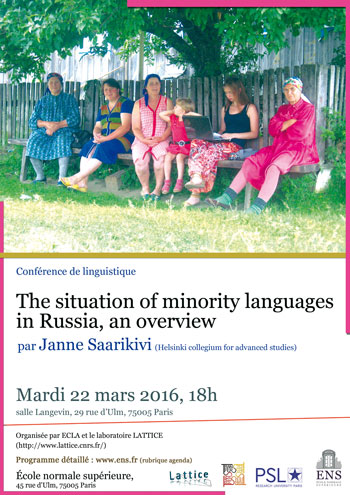Conférence de linguistique – Janne Saarikivi
The situation of minority languages in Russia, an overview
par Janne Saarikivi (Helsinki collegium for advanced studies)
In my talk I will present an overview of the sociolinguistic processes currently taking place among the linguistic minorities of Russia in the post-Soviet realm. The presentation is based on the materials collected during the research project MINOREURUS (http://blogs.helsinki.fi/minor-eurus/). Post-Soviet Russia is in a transitional stage from a multilingual empire towards a nation state, and different types of regional and centralized powers (federal government, autonomous republics and local circumstances) affect the language policies in Russian regions. Some 20 % of the Russian population or approx. 30 million people belong to linguistic minorities. From the point of view of area, the importance of linguistic minorities is even bigger, because most of Russian surface is occupied by rural population speaking a non-Slavic language. In comparison with the EU minorities, many of the Russian linguistic minorities still show considerable endurance in their traditional areas, but the rights of the minority language groups depend very much on regional powers. For instance, the Finno-Ugrian languages have practically no educational rights (kindergardens, primary schools, etc.) in the autonomous regions designed for the Finno-Ugrian peoples, but such rights exist in the areas designed for Turkic minorities, since these have emerged as stronger political players on the federal level. Many language communities are currently undergoing a language shift to Russian, especially in the urbanized environments. However, the modernization processes also change the role of the minority languages and minority identities that sometimes turn fashionable and appreciated, especially among the educated class.
Mis à jour le 5/1/2017

